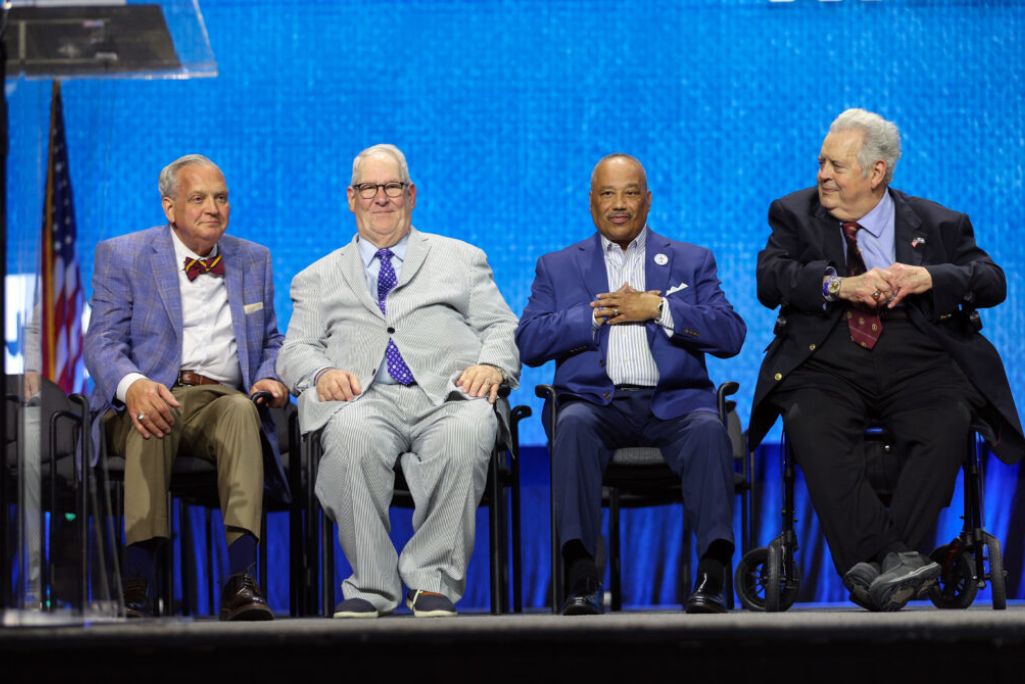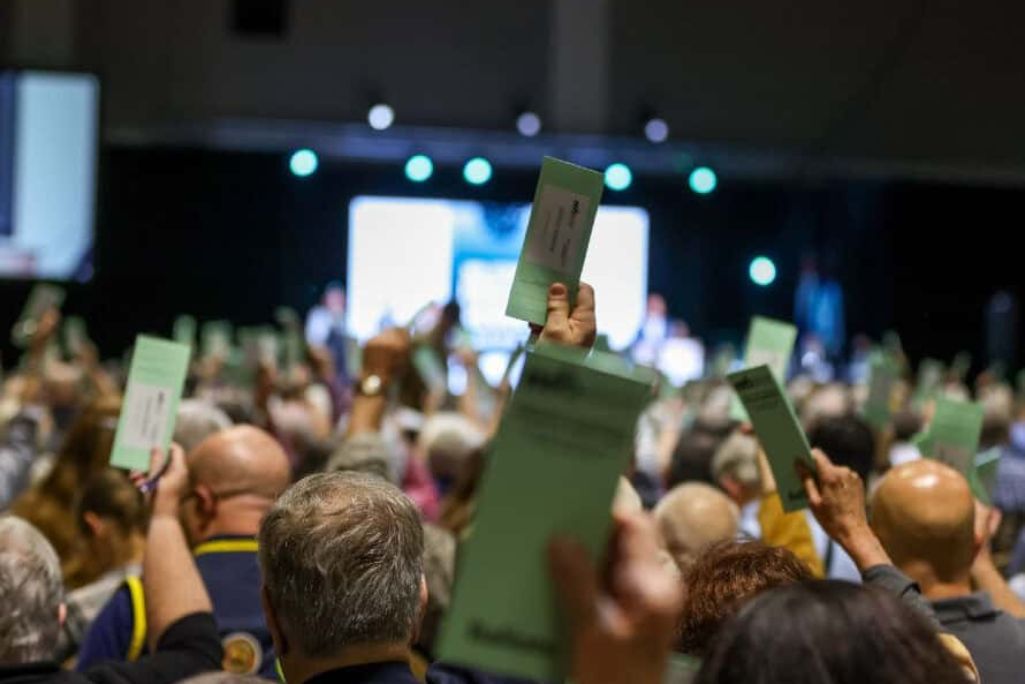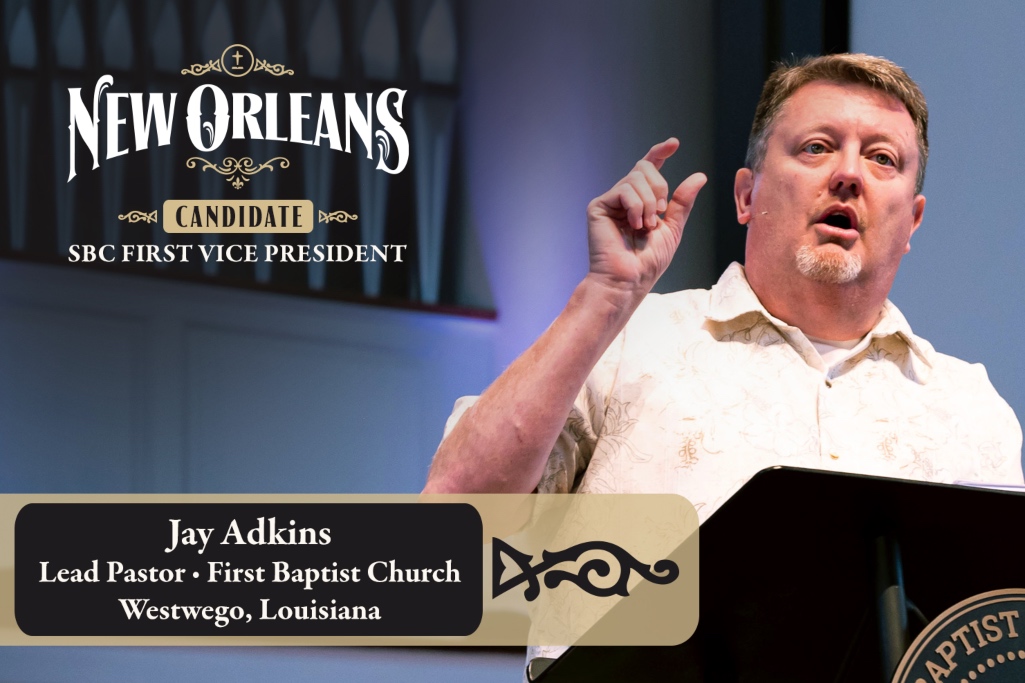
Members of the Baptist Faith and Message 2000 committee (left to right) Albert Mohler, Chuck Kelley, Fred Luter and Richard Land were on hand to celebrate the state of faith's 100th anniversary during the June 11 afternoon session of the 2025 SBC annual meeting in Dallas.
DALLAS (BP) — In honor of the 100th anniversary of the original, 1925 Baptist Faith and Message (BF&M) and the 25th anniversary of the 2000 BF&M, messengers at the Southern Baptist Convention (SBC) annual meeting in Dallas passed a resolution affirming the confession of faith for its “doctrinal integrity” and the grounding it provides for Southern Baptist cooperation.
“It is our shared confession,” said SBC President Clint Pressley. “It is no small thing that we have been held together for so long by one confession.”
A prerecorded presentation by Southern Baptist Theological Seminary President (SBTS) Albert Mohler, member of the 2000 BF&M committee, explained that Southern Baptists came together in 1925 in order to clarify “to the world” the beliefs they held.
The resolution honoring the BF&M began by acknowledging the ultimate authority of the Bible and saying, “Southern Baptists have been a confessional people throughout our history, adopting statements of faith as a witness to our doctrinal convictions and as a pledge of our faithfulness to the truths revealed in Holy Scripture…”
The early 20th century saw increasing division among the nation’s leading denominations regarding modernism and a commitment to the fundamental doctrines of Scripture. In 1918, the Georgia Baptist newspaper, The Christian Index, published a book outlining core doctrines. The book’s high demand helped demonstrate that Baptists had a growing interest in a statement of faith of their own.
Even before the dawn of the 20th century, Southern Baptists were to discover they had not escaped the creeping liberalism of a changing world.
In 1879, Southern Seminary Old Testament professor Crawford Toy was forced to leave because of his own acceptance of evolutionary theory over a commitment to the complete truthfulness of Scripture. The SBC’s Foreign Mission Board rescinded the appointment of two missionaries not long afterward because of similar views.
The time had come to state clearly what Southern Baptists believed.
Mohler said that the original framers of the BF&M looked to the New Hampshire Confession of Faith as a guide for verbalizing Southern Baptist beliefs but with nuances to make it their own.
The 1925 confession grounded Southern Baptist belief and practice for 40 years. Still, creeping liberalism continued to show up at Southern Baptists’ door.
In Southern Baptist academia, 1958, 12 professors at Southern Seminary, almost half of the theological faculty, were dismissed for views deemed too far outside Southern Baptist doctrinal commitment.
More controversy erupted in 1961 over a commentary on Genesis written by Midwestern Seminary’s Ralph Elliott that denied the historicity of Genesis 1-11. The time had come to give the BF&M a stronger statement on the authority of Scripture.
While the 1963 version provided a stronger statement, “it did not settle the controversies,” Mohler said.
Issues such as the inerrancy of Scripture, the exclusivity of salvation in Christ, a world vision for the gospel and clear, biblical stances on moral issues prompted the 2000 revision.
The Conservative Resurgence, ushered in by the 1979 election of Adrian Rogers as SBC president, marked a return to a strong view of Scripture with an understanding that it was “inerrant and infallible.”
Mohler explained that the 2000 revision brought clarification and said “to a watching world, this is what we believe … without hesitation, this is what we stand upon.”
Fred Luter Jr., a member of the 2000 BF&M committee and former SBC president, noted that of all the boards and committees he has served on, his “greatest honor” was to serve on the 2000 BF&M committee.
“I was proud then. I’m proud now of the work that has been done,” Luter said.
Luter urged listeners to apply the BF&M to “their lives, their ministries and their churches.
“The same God that blessed us 25 years ago will bless you continuously now,” he said.
Present for the presentation were members of the 2000 BF&M committee — Mohler; New Orleans Seminary President Emeritus Chuck Kelley; former Ethics & Religious Liberty President Richard Land; and Luter, pastor of New Orleans’ Franklin Avenue Baptist Church.


